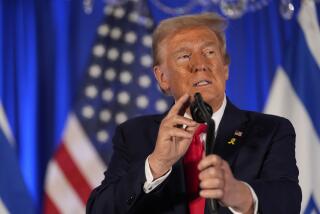Phone Fails Bush as Diplomatic Tool : Soviets: After failing to get through to Gorbachev, he faces the fact that he can’t thwart a coup with a call.
- Share via
KENNEBUNKPORT, Me. — The ubiquitous device that George Bush had elevated to an instrument of diplomacy became the lowly telephone again Tuesday when a Kremlin receptionist told the President that his old friend Mikhail S. Gorbachev was not available to take his call.
The surreal exchange marked a moment of reckoning for an American President who has relied on his phone to take the pulse of governments around the world.
In trying to work his touch-tone diplomacy amid the Soviet crisis, Bush failed to reach the man who lost power, and he refused to speak to those now in control; but he managed to get through to Russian republic President Boris N. Yeltsin, whose authority is imperiled.
By refusing to take any steps that might lend legitimacy to the new Soviet regime, Bush has put himself in the difficult, uncharacteristic position of an outsider, able to rely only on indirect means to influence events in an extraordinary crisis.
More than anything else, the ease and frequency with which Bush had been able to talk to Gorbachev demonstrated the extent to which the East-West relationship had changed over the last two years.
The sudden return to darker times has brought with it a reprise of the diplomatic style of days gone by, with the Soviet ambassador carrying to the White House a letter from his new boss, and Bush dispatching a new ambassador to Moscow to arrange whatever direct contacts with the Kremlin that the United States now chooses to make.
To be sure, the President has not put his phone aside. As he did a year ago when methodically cementing the U.S.-led coalition that opposed Iraq’s invasion of Kuwait, Bush has raced through his global Rolodex to plot strategy and send assurances to like-minded leaders around the world.
But, for all their value in enlisting worldwide statements of support, these calls could not overcome the fact that the White House, no matter how hard it tried, could not reverse the downfall of a man who had become a uniquely close ally.
When the White House asked Tuesday for the President to be put through to the man he still regards as the constitutional president of the Soviet Union, the person who answered the phone in Gorbachev’s Kremlin office said only that “they can’t do it at this time,” an Administration official related.
The call was the second time in 12 hours that the President had failed to reach Gorbachev, believed to have been detained in the Crimea.
White House Press Secretary Marlin Fitzwater said later that the Kremlin operator suggested that Gorbachev might return Bush’s call. But, by late Tuesday night, Bush had still not heard from him.
Secretary of State James A. Baker III had a similar lack of success in trying to reach his Soviet counterpart, Foreign Minister Alexander A. Bessmertnykh, Fitzwater said.
In calling Yeltsin, Bush made direct contact with the defiant Russian leader, who had taken shelter in a government building in downtown Moscow. White House officials said that there had been no effort to establish an open phone line with Yeltsin’s headquarters, but one aide said: “Undoubtedly, we will call him again.”
More to Read
Sign up for Essential California
The most important California stories and recommendations in your inbox every morning.
You may occasionally receive promotional content from the Los Angeles Times.













